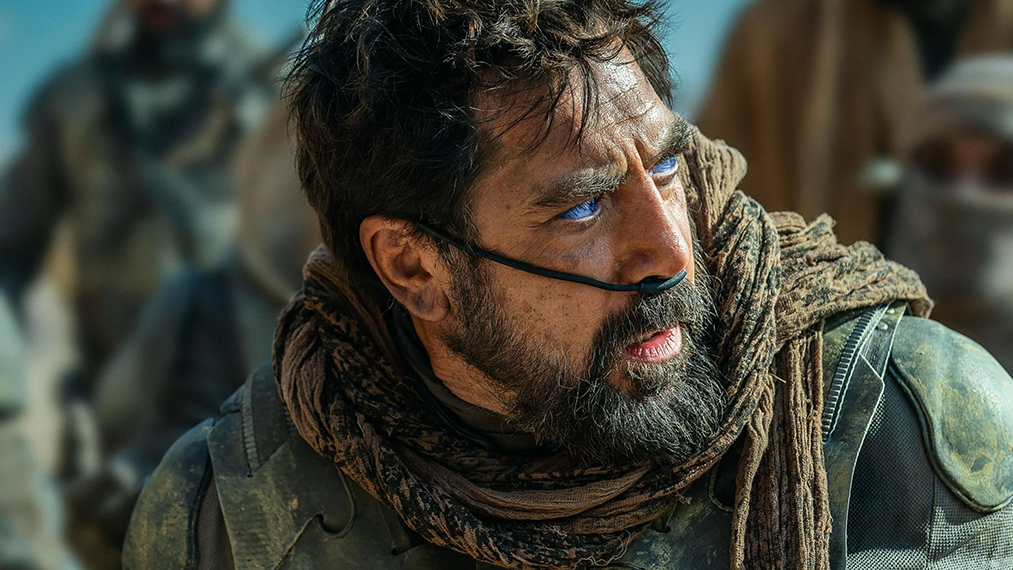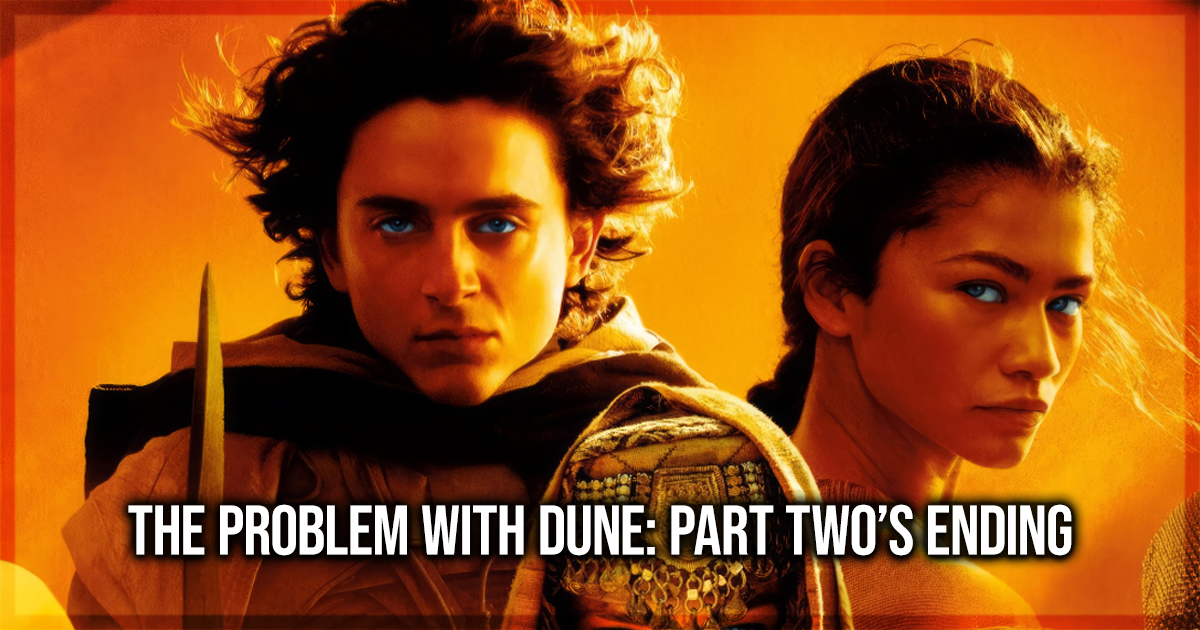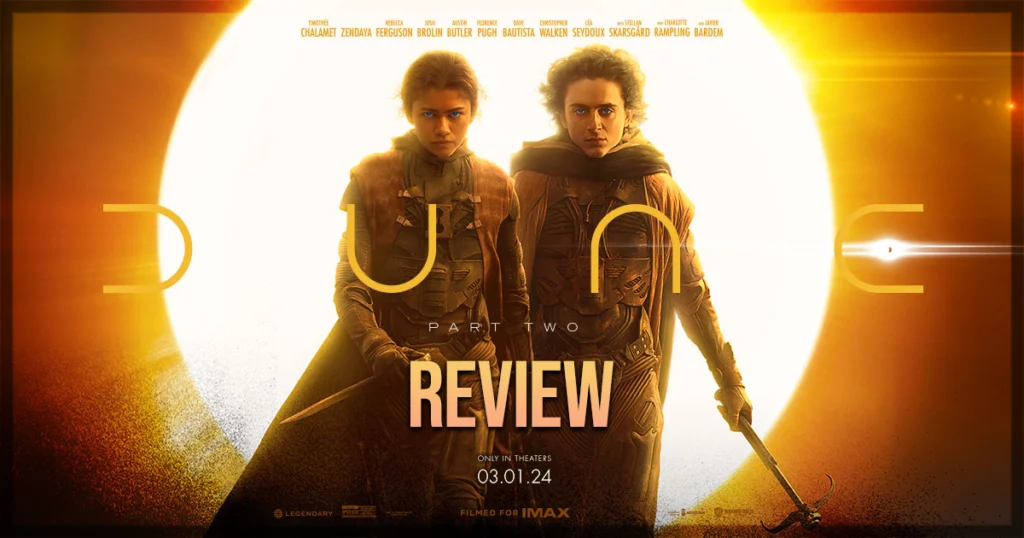Well, here we are. After being delayed over five months because of the SAG-AFTRA strikes, Denis Villeneuve’s sci-fi epic Dune: Part Two (and its infamous popcorn bucket) has hit theaters worldwide. This second film, an adaptation of the second half of Frank Herbert’s 1965 novel, follows immediately after Dune (2021) and continues the journey of Paul Atreides (Timothée Chalamet).
[Editor’s Note: There are spoilers for Dune: Part Two and Arrival ahead.]
The story of Dune: Part Two
Paul is the son of Duke Leto Atreides (Oscar Isaac) and Lady Jessica (Rebecca Ferguson), a member of the religious body the Bene Gesserit. After he escapes from the Atreides massacre that killed his father and bookended the second act of Dune (2021), Paul joins the Fremen, the native residents of desert planet Arrakis, in their fight against the Harkonnens. The Harkonnens are a family of fascists who run a dictatorship that is blinded by capitalistic desire. The maniacal family, whose home planet is leeched of color, run the trade for Spice.
Spice exists on Arrakis and is a highly sought-after ingredient in fuel for faster-than-light travel. Paul, who has been lauded as a messianic character who will save the Fremen, assists them in their attacks on the machines extracting the Spice that the Harkonnens will sell for intergalactic profit. During this time, Paul ingests the Spice, which makes his visions of the future clearer. By the end of Dune: Part Two – where an hour of the film is dedicated to Paul’s integration into the Fremen, complete with a blisteringly entertaining section of worm-wrangling that puts every Western to shame – Paul has accepted his position as a messianic figurehead after having first rejected the notion that he was their savior.

To do so, he drinks their ‘water of life’: a poison derived from the venom of juvenile sandworms. Paul can now see everything and every possibility all at once. By doing this, he is aware of every outcome of his decisions and, as such, chooses to marry Irulan (Florence Pugh), the daughter of the Emperor (Christopher Walken), shunning his love interest Chani (Zendaya) in the process. This successfully ends the Harkonnen reign of terror and the oppressive thumb of the Emperor in one fell swoop. However, there’s a fundamental flaw with Dune: Part Two. Specifically, the final thirty minutes that occur once Paul has taken on what amounts to godly powers, and it’s one that can be traced back to a previous film in Villeneuve’s filmography.
The problem with Dune: Part Two’s ending lies with Arrival
Let’s go back to 2016 and take a look at Villeneuve’s Arrival. The film, which most people in the online sphere recognize as Amy Adams’s finest work and deserved her a position in the Best Actress Academy Award lineup that year, adapted a short story. Story of Your Life by Ted Chiang was a novella written in 1998. This story was then taken by Eric Heisserer and adapted into the screenplay used to make Arrival, taking the occasional dramatic liberty that all adaptations must. Dune: Part Two’s ending problem doesn’t lie with its unwillingness to change or even in its adaptation changes but that the final five minutes of Arrival achieves what I believe Villeneuve is attempting to pull off here.
Arrival follows Louise (Amy Adams) as she attempts to decode the language of the Heptapods. These strange, mysterious, giant alien creatures plant themselves 50 feet above the ground in 12 different locations around the world. As Louise learns their language, she unlocks the ability to see through time and space. The past and the present coexist in one congealed mess of linearity, freeing her mind from linear time. Louise takes this journey to save the world, much like Paul does to save Arrakis.
But in the final five minutes of Arrival, the responsibility of this power is shown. Louise, who can see every splintered future path laid out for her, must make a choice. She can see into the future, and she witnesses her relationship with Ian (Jeremy Renner) come to life. She can see that she gives birth to a daughter, Hannah, with him. But she can also see Hannah cruelly taken away from her by an incurable illness and that her marriage will break down because of it.
So she has to make a choice: an impossible one. She can save her marriage to Ian and save the heartbreak of losing her daughter Hannah with one decision: she can choose never to have Hannah. With this, Villeneuve ambiguously asks us as an audience, “What would we do?”. Would you choose never to have a child? Would you miss out on 13 years of memories, experiences, and love? Is the heartbreak of losing your daughter and husband worth never having your daughter in the first place?
Dune: Part Two is missing the complicated moral questions that help make Arrival interesting
These complicated moral questions are omitted from Dune: Part Two. Paul and Louise are omnipotent creatures, but Louise is given an impossible task while Paul isn’t. There is a common phrase used when attempting to dissect the powerful: “What do you give someone who has everything?” and in Arrival, Villeneuve sets a difficult question to his all-powerful protagonist, while In Dune: Part Two, Villeneuve fails to set Paul a tangible enough question that make audiences care about the outcome. Paul becomes almost despotic, a pre-eminently powerful messiah character, and his victory – and whatever victory will no doubt occur in an eventual third Dune installment – becomes a foregone conclusion. The breath audiences have held for four and a half hours of this stunning, gargantuan spice opera can be let out with a sigh. It’s all too easy and too simplistic for audiences to find an emotional root.

Perhaps Villeneuve is trying to infer a similar question that Arrival poses with Paul sacrificing his relationship with Chani as he marries the emperor’s daughter for political power. But their relationship is bland; all their chemistry washed away in the desert sun, and their spice was absorbed by Arrakis. The supposed sacrifice has no emotional weight because we have no investment in their relationship, while the potential sacrifice of Hannah is presented as a much more difficult emotional process.
Arrival discusses the concept of the Zero-Sum Game. It is a gaming theory where everybody wins as the product of a sum, equating to both parties getting an equal amount. Louise, having the ability to see through the binary of time, has that emotional responsibility and is presented to the audience as equal, her turmoil matching her strength. Paul, whose power is presented as autarchic, is given too little. Not only does it make the finale emotionally stagnant and arguably moot, it makes the character of Paul much less compelling.
It is an almost wilful misinterpretation of the famous quote from Spider-Man; “with great power comes great responsibility.” This might all be completely redundant with an eventual Dune: Part Three, if that film becomes critical of Paul and his choices made here, a film that may even turn this narrative choice into a villain origin story with Paul as an anti-hero. But with what is presented to us in Dune: Part Two, there is a lack of criticality aimed towards Paul that can’t be ignored in favor of what future installments may or may not have planned.
Dune: Part Two removes the complexity from Paul
Films are powerful tools in tackling oppression because they indict those in power, and when films refuse to engage critically with the bourgeoisie, what purpose do they serve? Paul’s hubris and flaws in Dune: Part One and his refusal to embrace the chosen one legacy thrust upon him in this is what made him a complex character. To remove his complexity is to remove the audience’s interest. Now that he’s a genie sprung from the lamp of familial oppression, his victory rings hollow, and the character has no value to audiences anymore. After all, when you’ve got everything, don’t you have nothing?
Dune: Part Two is now in theaters.
Does Dune: Part Two’s ending strike you as similar to Arrival? Do you agree with Connor about the major difference? Let us know by connecting with us on X @MoviesWeTexted.
You might also like…
‘Dune: Part Two’ Review: A Cinematic Triumph


